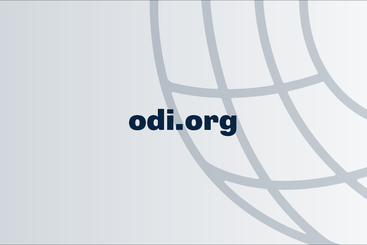Governments around the world are increasingly aware of the importance of diaspora networks to foster sustainable development, primarily in countries of origin. In 2018, the Global Compact on Migration established the creation of conditions that allow diaspora networks to contribute to sustainable development through the transfer of skills, social capital and financial resources as a key objective. And diaspora engagement is increasingly prioritised in national development strategies, with many impressive initiatives under way.
Yet policy interventions often fall short of enhancing the diverse, positive contributions of diasporas – especially those beyond financial remittances. Convening governments, civil society and researchers leading pioneering initiatives at the Global Forum for Migration and Development, we asked: how can government partnerships better support diaspora contributions to sustainable development? Here, we share the key reflections and policy recommendations.
Diaspora networks are key to sustainable development, as increasingly reflected in government strategies
Research by the Organisation for Economic Co-operation and Development (OECD) on more than 150 official national development plans released between 1997 and 2023 found that diaspora engagement is a highly referenced area, and increasingly so. This may not be surprising, given the fast rise of remittances to low- and middle-income countries and the importance this has on national accounts, economies and livelihoods. To give one example: today, remittances to the Gambia account for nearly one-third of its gross domestic product (GDP), and in 2018, the diaspora was recognised as the ‘Eighth Region of The Gambia’ in its diaspora strategy – as noted by Sheikh Abdallah Jah, Gambian Diaspora and Migration Directorate.
Increased diaspora engagement has been aided by the creation of diaspora focal points, dedicated ministerial and directorial appointments and national diaspora strategies. This is the case for both the Gambia and Ghana, where diaspora engagement has multi-sectoral governmental portfolios with prioritised government resources to encourage diaspora public and private investments for the development of localities. In Ghana, a dedicated office of diaspora affairs, created in 2017, forms part of the Office of the President. During the event, the establishment of this office was noted as instrumental in Ghana’s recent, pioneering initiatives on diaspora engagement by Akwasi Ababio, Director of Diaspora Office, Government of Ghana.
Diaspora-led initiatives are doing important work, and have been for a long time
While diaspora engagement is a growing policy agenda, the movement of people, the social change, and transnational connections this brings is a tale as old as time that has shaped all our lives and societies. In 2021–2022, the MIGNEX project collected data on migration and development across 26 areas in 10 countries across Africa, the Middle East and Asia. Findings highlighted the far-reaching implications of diaspora engagement for cultural and economic development in countries of origin.
Some 19% of all households had received remittances and 16% of young people knew of migrant investments. This included coverage of gaps in government services as the construction of schools in Kombolcha, Ethiopia, and road infrastructure in Ekpoma, Nigeria. In São Nicolau, Cabo Verde emigrants have long helped to sustain a decent standard of living and almost all young people (96%) agreed that when people emigrate, they support their family members. Investments also extended to funding for business initiatives in Kabul, Afghanistan and Chot Dheeran, Pakistan; the refurbishment of an inter-faith cemetery in Down Quarters, Nigeria, and an annual, diaspora-funded festival in New Takoradi, Ghana.
We also saw less tangible effects on norms, and social and cultural development. Across all 26 areas, higher levels of migration was correlated with a positive effect on civic participation and girls’ secondary enrolment. This, we believe, is due to the ways in which migratory experiences can shape social norms and values. For instance, the effects on civic and political participation may have been impacted by changes in perceptions of what constituted quality governance, as a result of the experiences of migrants.
These examples demonstrate the diverse effects of migration that come about through mutually beneficial, diaspora-led initiatives. Leander Kandilige, Centre for Migration Studies, University of Ghana noted that governments should thereby seek to support existing networks; by fostering diaspora-homeland relations and strengthening systems for diaspora members to continue to mobilise resources for sustainable development.
Mutually beneficial, diaspora-led initiatives are key to fruitful engagement
While high on the political agenda, effective diaspora involvement and investment are not a given. There must be an enabling environment in which diaspora members naturally want to engage. On the one hand, this means a business-friendly environment and structures that incentivise the diaspora to channel their efforts, such as Mexico’s 3x1 matching programme for investment in people’s hometowns.
But more importantly, it’s about connecting with diasporas on matters important to them: fostering connection, sense of identity and the will to engage. Here, Ghana offers a good-practice example of a mutually beneficial, creative approach to diaspora engagement that starts with building a connection in the short term to allow for diaspora investment in the longer term. Akwasi Ababio, the Director of Diaspora Affairs in Ghana, shared how activities like the annual Year of Return, targeted at the wider diaspora – including descendants from enslaved people – leveraged culture and identity to increase diaspora engagement and tourism, and then eventual investment over time. The UK’s recently agreed return of stolen artefacts to Ghana is also an opportunity to reinforce cultural identity and connection, as pointed out by Stella Opoku-Owusu from the African Foundation for Development (AFFORD).
Policy options for diaspora engagement
1. One size won’t fit all
An obvious yet often overlooked point: no one diaspora engagement initiative will work for all. Diaspora members have diverse skillsets, experiences and interests; programmes tailored towards those are key to meaningful, sustained engagement. And critically, sector-specific programmes that engage diaspora members from the start; to channel their skills, develop tools and knowledge are a win-win situation for the development co-operation partner and country of origin too.
Donors have increasingly included projects targeting diasporas in their development initiatives, but this doesn’t go far enough. A major, overlooked opportunity is the inclusion of diasporas in all projects, as specialists in their field, delivery and implementation actors, whether this is in agriculture, labour markets, digital services or financial markets. This is also an opportunity for governments to channel investments in under-resourced areas of the economy, or into sectors viewed as future cornerstones of growth. A tangible example of this is skills mobility partnerships; initiatives largely led by donors and partner countries in need of labour that rarely include diaspora-engagement components
2. Create an enabling environment to encourage investment
Recent initiatives, including Ghana’s Year of Return, demonstrate the need for creative engagement on issues that matter to diaspora members. But there is some way to go in understanding and scaling up policy for diaspora engagement and investment.
What contributes to the decision to invest or engage in countries of origin? Financial sector changes? Agricultural norms? Trade facilitation? Education? Skills sharing and knowledge exchange? More research is needed here, but one immediate opportunity for governments of origin is to inform and attract the diaspora to the country with guidance on how to invest from another country, where the opportunities are, and whether legislation or other rules have changed that could impact their decision on whether to engage and invest with the country of origin directly.
Looking forward
Diaspora engagement is a growing policy priority for national governments within an uncertain, at times hostile, political climate on migration internationally. Moving forward, there must be a fundamental understanding: for diaspora members to contribute to sustainable development – in origin and receiving countries – their rights and freedoms must be upheld. Diaspora engagement doesn’t exist in a vacuum, but is dependent on broader policies and partnerships that protect migrants everywhere.





